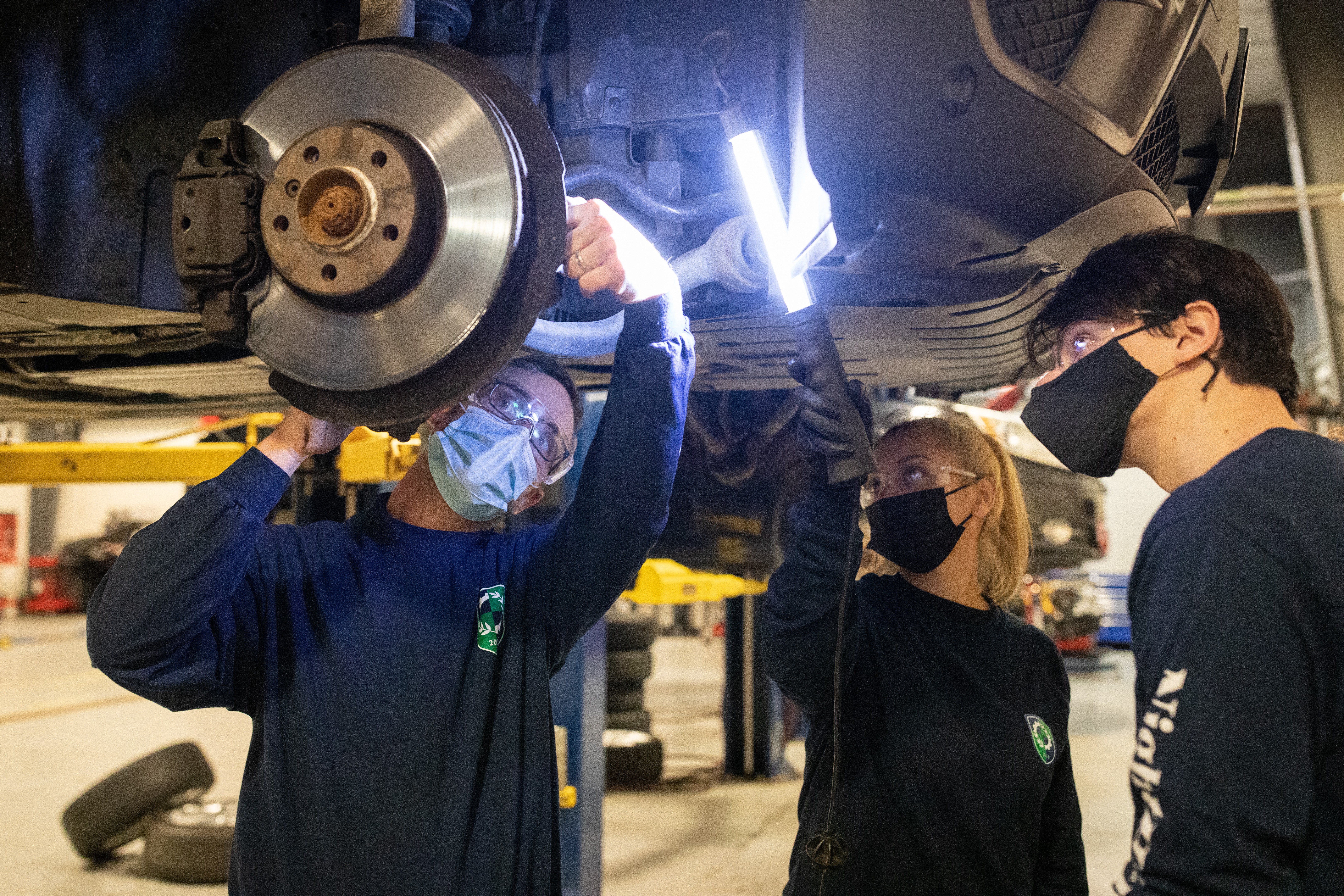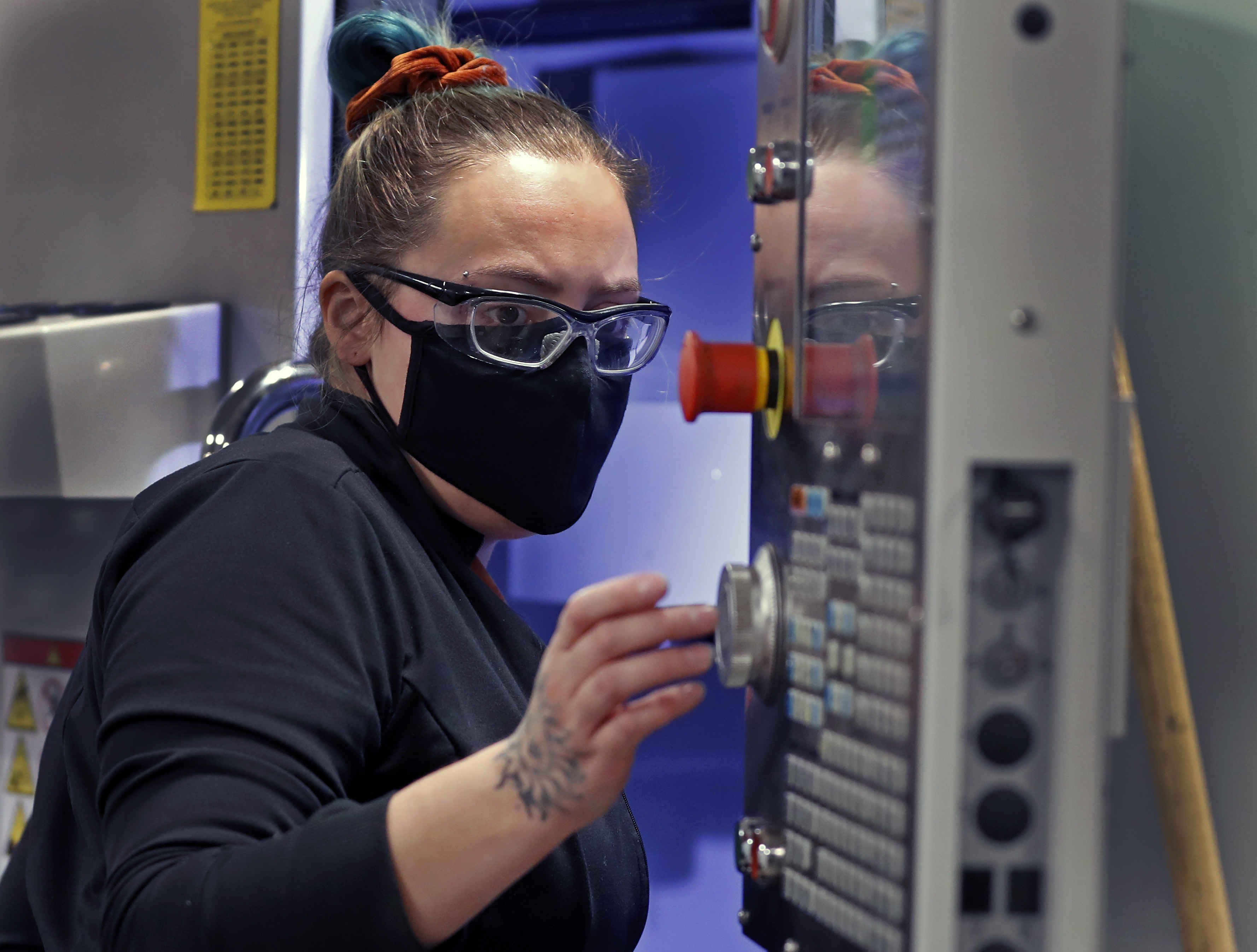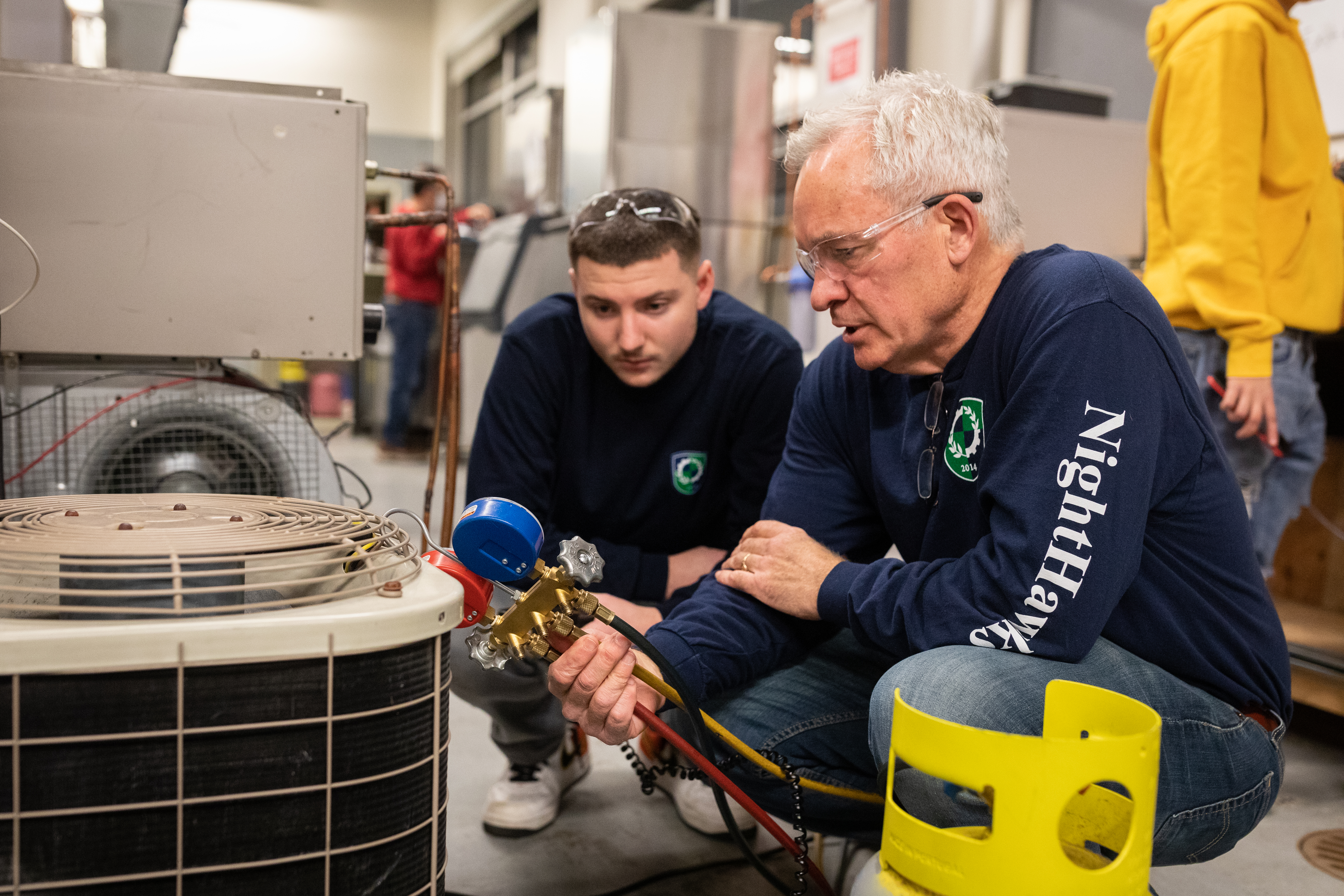
One evening in early December, at the Essex North Shore Agricultural and Technical School in Danvers, carpentry instructor Brian Borders inspected the sheds being built by Klajdi Karaj and Adam Aylward.
Several doors down, HVAC instructor David Melanson pointed to a schematic drawing and quizzed students Jared Toppi and Brody Monkiewicz about the pathway of an electric current.
As they pondered their response, automotive instructor Louis Beckwith, at the opposite end of Essex Tech’s sprawling campus, had a trio of young adults – Aden Cotto, Savanny Kent, and Zahira Roldon – inspecting the brakes of a BMW X5 sports utility vehicle.
These carpentry, HVAC, and automotive classes were just three of Essex Tech’s newest Nighthawks adult learning programs, underwritten by the state’s Career Technical Initiative program (CTI).
The classes include construction and carpentry, HVAC (heating, ventilation, and air conditioning), automotive, plumbing, CNC (computer numerical control) machining, welding and metal fabrication, and electro mechanical assembly. Unlike traditional night courses, which run between $400 and $600, the CTI courses are offered at little to no cost to participants at schools throughout the region.
“We’re passionate about vocational education and see the opportunity that it can provide for individuals, their families, companies, and within our communities,” said Bonnie Carr, director of Workforce Development at Essex Tech. “We’re happy to have the facility to do it and resources for the opportunities to continue.”
The CTI program, said Heidi Riccio, Essex Tech’s superintendent, is an extension of the school’s mission as a resource, providing a foundation for a career in the trades while addressing a workforce need. Carr agreed: “The aging workforce in these fields is creating a gap that is ripe for the filling.”
How old is that workforce? Essex Tech plumbing instructor Karl Jacobson said the average age of a master plumber in Massachusetts, for example, is 57.
“There’s a huge need” for more experienced plumbers, said Jacobson. “That’s what this course is all about – showing [students] what kind of work they’re going to do, what kind of wages they’re going to make, what their day-to-day life is going to be like, before they actually go get a job.”

The courses are short (13-15 weeks) but intense (16 hours a week, evenings and Saturdays). Previous experience isn’t necessary (Riccio said one trade student had a doctorate degree), and there are no set age limits. Since the students are older, said Jacobson, “they’re more serious. They’re out of school, they’re trying to support their family or themselves.”
“I think they understand the opportunities that they have a little bit better,” he said.
The complementary goals of the state-sponsored CTI program are elegant – give potential employees a leg up on a new career by providing an educational jumpstart, which in turn will help resolve a demonstrable labor shortage in those fields.
“The intent of the CTI initiative was to respond to community engagement processes that the state cabinet used, called the Regional Blueprints, which identified very significant current hiring challenges and future hiring challenges among skilled trade occupations,” said Robert LePage, the state’s assistant secretary for Career Education. “For example, construction and manufacturing are very aligned to the types of infrastructure that our vocational schools have. So it was really a workforce strategy.”
In early 2021, Governor Charlie Baker’s Workforce Skills Cabinet announced the first round of CTI grants, totaling $1.3 million shared by eight schools, including Greater Lawrence Technical School ($385,000) Essex Tech ($240,000), Southeastern Regional School District ($150,000), Montachusett Regional Vocational Technical School ($125,000), Minuteman Regional Vocational Technical School District ($110,000), Nashoba Valley Technical High School ($100,000), Greater Fall River Vocational School District ($100,000), and Whittier Regional Vocational Technical High School ($90,000).
This past fall, two more locations – Greater Lowell Technical High School and Madison Park Technical Vocational High School – came on board. Beginning in 2022, the addition of Assabet Valley Regional Vocational, Greater New Bedford Vocational, South Shore Regional Vocational Technical High School, Upper Cape Cod Regional Technical School, Westfield Technical Academy, and Worcester Public Schools/Worcester Tech will bring the number of participating schools to 16.

According to Edward Bouquillon, superintendent of the Minuteman Regional Vocational Technical School District, the Workforce Skills Cabinet came into being under Governor Deval Patrick, “but has really grown and become very effective under the Baker administration.” The key, he said, is that officials from the Department of Labor and Workforce Development, the Department of Education, and the Executive Office of Housing and Economic Development are finally working together.
“Those three silos, for decades, were unable to create any synergy when it came to improving individual economic opportunity to training, either training for workers who were out of work, or needed to upgrade their skills, or may have been changing careers,” said Bouquillion. “By engaging the governor and the Workforce Skills Cabinet, those three silos now sit together at the same table.”
The grants are competitive, and recipients are required to verify the need. To do that, the schools have partnered with regional workforce boards and career centers, identifying trades that are facing shortages. Major target fields include manufacturing, construction, healthcare, and information technology.
“There is a real need for these programs that will allow people to enter the skilled workforce, particularly when the training can be provided through programs that are short-term and where funding would be a barrier to the student,” said Patricia Illsley, director of the Southeastern Technical Institute in South Easton.
Women are in particular demand, said Nancy Houle, executive director of the Minuteman Technical Institute. Minuteman’s recent “Build It” course, a carpentry pre-apprentice class, started with 10 women. Nine finished, and eight already have jobs in the field.
Janelle Marsh of Malden graduated from the Northeast Metropolitan Regional Vocational High School in Wakefield in 2009, specializing in cosmetology. But after a decade in retail, Marsh, now 30, was ready for a career change. She signed up for “Build It,” which is supported in part by the Council of Carpenters’ union Local 339.
“It was empowering to go back to school and take something that’s not common for women to be a part of,” said Marsh, who completed the course in December. “I know what the union has to offer, and this was a great opportunity to get my foot in the door in a male-dominated industry.”

The CTI program, however, isn’t simply a foot in the door. It can pry that door wide open, inviting students to introduce themselves to others in the room, including unions, contractors, and various business owners.
“CTI has provided an infrastructure for a strategic partnership to highlight the great opportunity that is career and technical education,” said Houle. “It’s been so rewarding to see our students doing what they love, in a place they’re comfortable in, building relationships with their instructors and peers.”
Hunter Caron, a 2016 graduate of Beverly High School, was working as a janitor in the Beverly schools after Daniel Webster College in Nashua, N.H., closed following his freshman year. As a hobby, the 23-year-old rebuilt his Jeep, and Caron’s mother recommended Essex Tech’s CTI automotive course.
“By the end of the class, I had 13 different dealerships and mom-and-pop shops that wanted me to put in an application. Thirteen of them,” said Caron. “I had Kelly Ford and Kelly Jeep fighting over me at a job event. That was fun.”
Caron and another classmate went to work as technicians with BMW of Peabody. That he was hired directly out of the course by a high-end dealership, he said, was an indication of the demand.
“Historically, you’ve always had to work at Toyota or Ford, and then you go to these big dealerships,” he said. “Now, for the first time, they’re open to entry-level technicians. That’s how much the market needs technicians.”
Beckwith brought his current students to visit Caron at work, providing a real world illustration of the course’s potential. Similar examples abound throughout the CTI program.
“The carpentry pre-apprentice program is by far our most popular,” said Minuteman’s Houle. “The apprenticeship component is especially compelling. Despite knowing they’re going to work very hard in extreme conditions, they’ll receive training, a good salary, benefits, and pensions. Those rewards are very enticing.”
School officials recognized that graduates aren’t finished products. But they’re better prepared to contribute immediately, easing their transition into their new trade.
“When participants successfully complete the program they’ll generally start working, and on the job they’ll continue their coursework based on their employer,” said Carr. “For example, students going into Local 22, the carpenters’ union, or any of the [auto] dealerships, will be earning industry credentials based on the employer’s needs and expectations.”
Or, as Sam Axford, a 21-year-old Haverhill High graduate who recently finished the HVAC course and earned his certification, said with a laugh: “I would love to go back and take another course, and learn more, instead of getting wrenches thrown at me.”
Like any new program, there have been growing pains. Launching the program during a pandemic was a major challenge, since the trades require hands-on instruction and many potential students were leery of in-person classes. School officials say they’re still trying to advertise the program, to guarantee maximum class size.
“It’s been difficult to get people to engage, just like it’s been difficult to get people back into the labor pool,” said LePage. “If there is hesitancy to get back in the labor pool, than there’s a hesitancy to get into training programs.”
Childcare and transportation, as well as increased pay for instructors from the field, also need to be addressed, said school officials. However, Bouquillion said LePage and his team “have done an excellent job of listening” to school officials and people in the trades, and continue to work toward resolving those issues.
“The Workforce Skills Cabinet, which is now been through two administrations, is here to stay,” Bouquillon said. “As long as that is in place, I have absolutely no fears of these kinds of initiatives disappearing.”
For details on programs being offered this winter and spring, visit the websites for individual schools. Globe correspondent Brion O’Connor can be reached at [email protected].





